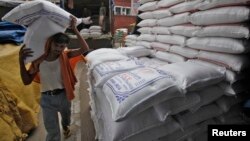India has defended its decision to block a global trade deal by the World Trade Organization (WTO), but says it is still willing to join the pact if its concerns are addressed.
Addressing parliament on Wednesday, Commerce Minister Nirmala Sitharaman said New Delhi could not consider the deal due to concerns that parameters of the agreement would hamper the government's ability to distribute subsidized food to the poor. An ambitious law passed last year commits the India government to provide nearly 850 million people with wheat and rice at very cheap rates.
“Issues of development and food security are critical to a vast swath of humanity and cannot be sacrificed to mercantilist interest," she said. "Developing countries such as India must have the freedom to have food reserved to feed their poor without the threat of violating any international obligations. This is our sovereign right.”
New Delhi is wary of a clause in the WTO deal that restricts farm subsidies to 10 percent of agricultural production. India currently buys wheat and rice from farmers at above-market prices to boost output and build food stocks that are distributed at subsidized prices to poor people.
Designed to streamline customs rules and red tape, cutting costs of shipping goods across the world, the deal fell through last week when India refused to ratify it. Many diplomats had assumed the India officials would have adopted the pact after having agreed to terms of the deal at a December 2013 trade conference in Indonesia.
Criticism
Amid widespread criticism for jeopardizing a deal that by some estimates could boost world trade by $1 trillion and create more than 20 million new jobs — estimates that some Indian officials considered highly exaggerated, according to Reuters — Sitharaman indicated that New Delhi is willing to sign the pact if its demands on food subsidies are met.
“I am confident that India will be able to persuade the WTO membership to appreciate the sensitivities of India and other developing countries and see their way to taking this issue forward in a positive spirit,” she said.
The WTO says huge stockpiles of food in India could distort global trade, as they drive local prices down and dampen prices in one of the world’s largest markets.
Most economists in India say New Delhi is committed to global trade reform, but faces a genuine problem in meeting promises made to farmers and poor people.
“It is not that India wants to bypass WTO," said economist D.H. Pai Panandiker, president of the RPG Foundation, a New Delhi-based research group. "One problem that India has at the moment: the farmers are very poor and have to be given sustenance. If it is resolved, India will immediately go in for signing this agreement.”
Among staunch supporters of the deal, however, fears persist that if a solution is not found in the coming weeks, many countries will opt for regional agreements, setting back efforts for significant trade reforms.




